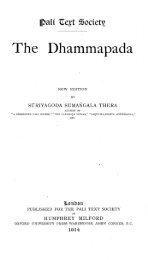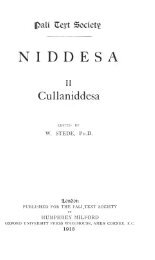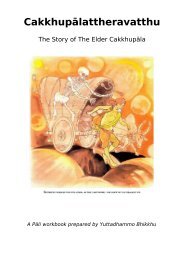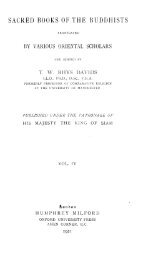Lessons In Practical Buddhism - Sirimangalo.Org
Lessons In Practical Buddhism - Sirimangalo.Org
Lessons In Practical Buddhism - Sirimangalo.Org
You also want an ePaper? Increase the reach of your titles
YUMPU automatically turns print PDFs into web optimized ePapers that Google loves.
Part Three: Subjective Experience<br />
No problem would arise for us if we were able to limit our<br />
experience to simply knowing the objects of experience for<br />
what they are as taught in the Bahiya Sutta. The problem is<br />
that as long as we do not to understand reality, based on our<br />
ignorance, we can’t help but give rise to some sort of mental<br />
formation, identification, etc., and therefore partiality. It is<br />
this partiality that the Buddha singled out as the problem<br />
that arises from ignorance. If we see something clearly for<br />
what it is, it won’t be possible for us to like or dislike it.<br />
This is a difficult point to understand, but it is the simple<br />
truth that can be seen by anyone who undertakes the<br />
practice prescribed by the Buddha to Bahiya as quoted<br />
above. Because we are so mired in greed, anger, and<br />
delusion, we think of partiality as an appreciation of some<br />
intrinsic quality inherent in the objects of experience. Due to<br />
our inability to see experience as it is and to see the objects<br />
of experience as simply arising and ceasing without any<br />
other inherent positive or negative qualities, we give rise to<br />
all sorts of theories and views about reality, which inevitably<br />
involve partiality, craving, seeking, obtaining, and finally<br />
disappointment and dissatisfaction.<br />
When we see something, for example, we normally conceive<br />
of it as either good or bad, beautiful or ugly, me, mine, etc.,<br />
based on deep-set partiality that has developed out of our<br />
ignorance. When we hear a sound, we recognize it as either<br />
pleasant or unpleasant sound, the voice of a friend or<br />
enemy, melodious or grating, and so on. Once this partiality<br />
arises, it will lead to intention in regards to the phenomenon,<br />
either to cultivate or suppress it.<br />
This is how all of addiction works. For meditators who have<br />
suffered from substance addiction, or addiction to any kind<br />
of stimulus whatsoever, they will find that the mind goes<br />
through all of these stages during the addiction process,<br />
cycling through the different aspects of experience, the<br />
causes and effects. Sometimes they will be aware of the<br />
physical or mental object of desire – the sight, the sound, the<br />
sensation, the thought, etc. Sometimes they will be aware of<br />
the pleasant or unpleasant feelings associated with wanting,<br />
117












